#young royals subtext
Text
Subtext and Culture, Young Royals, Season 3, Episode 6
Out here in the real world it's been a week since the cliffhanger ending of episode 5 where Simon broke up with Wilhelm, but in-universe it's just the next day, and Wilhelm is being comforted by Felice.
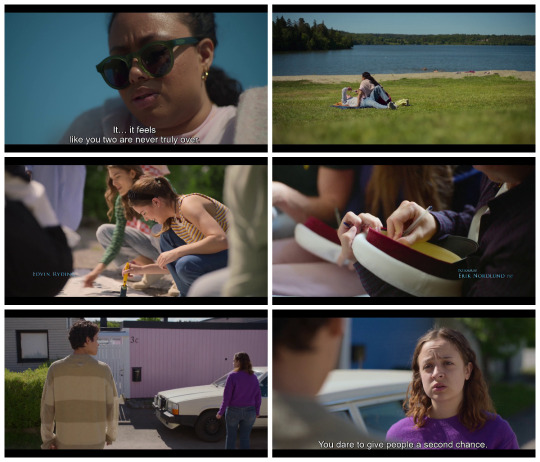
Subtext: This entire episode is incredibly meta, there are so many times characters say things that reference earlier seasons or episodes, or the entire series as a whole. This is the first time, and Felice is saying what we're all thinking. IS IT REALLY OVER?!? 😱
Blink and you miss it: Felice gives Wilhelm her sunglasses and dries his tears so he can hide the fact that he's been crying. Also, look at that gorgeous Swedish summer. It is so pretty.
Culture: The third-years are painting the banners that go on the trucks on graduation day.
Culture: They're also signing each others' student hats, which is a common tradition. You can just sign your name or write something funny or do whatever.
Culture: This car is what we in Sweden call a sossecontainer. It's an old 90's Volvo, it's square, it's ugly, and it was pretty cheap and reliable, so it was very common and popular among working class and the lower middle classes. It was never a high-status car, so it perfectly illustrates the Eriksson family.
Subtext: Oh look, another throwback to season 1 when Sara argued with Simon about their dad, and said that he should stop giving people second chances.
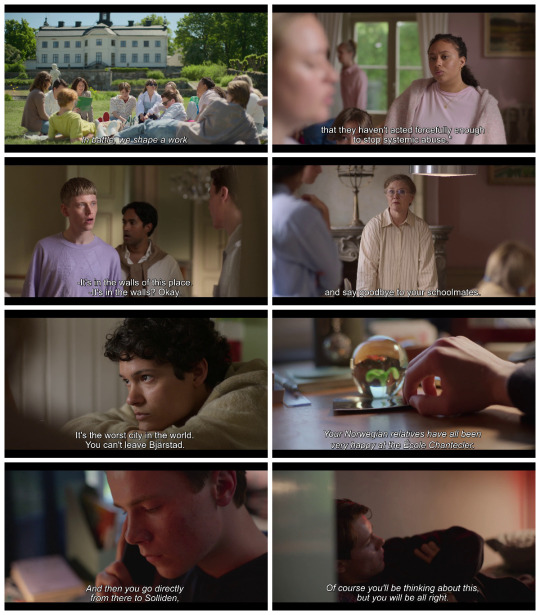
Culture: Oh look, another poem by Karin Boye. This time it's Eternity, a poem about cherishing your time with your loved one, and the text is about how good times feel like an endless summer, which is what it certainly looks like for the kids and their teacher in the lush landscape. But just like in the poem, their endless summer is about to end.
Culture: This is pretty much exactly the reason used when real-world Lundsberg was temporarily closed.
Culture: And Wilhelm isn't wrong, the shitty traditions are in the walls of the place, it's always been like that, and it's always been upheld by everyone involved with the school, parents, teachers, staff, and students.
Subtext: Since this is the last episode, let's prepare the viewers to say good bye to the show, and let's do it with a little montage of students crying and taking their stuff down and emptying their rooms.
Culture: This is a 100% factually true statement, Göteborg is the worst city in the world. Source: I'm a native Stockholmer, and you just have to trust me on this, ok? Look, it's just common sense, alright? Don't listen to people from Göteborg, they're just jealous they're not living in the glorious capital. Also, they talk funny. And they have no sense of humour! And everyone is named Glenn or something.
Culture: I don't think they're referencing an actual school here, and the current Norwegian royal children went to school in Norway, not Switzerland. But the current Danish crown prince went to some boarding school in Switzerland for a while, but then he went to the Danish elite boarding school Herlufsholm. However, it was rocked by a bullying scandal in 2022, so they had to pull him out of that one and deny all knowledge of the events. Feels familiar?
Culture: Solliden is the private summer palace of the real-world Swedish royal family located on Öland, an island off the south-east coast of Sweden. The show has consistently stayed away from every likeness with the real world, but I guess they couldn't be arsed making up a fictional summer palace for the YR royal family so they went with something familiar.
Subtext: Farima is talking about the problems of finding a new school for Wilhelm from an academic perspective, but he's just thinking about how this means he won't be close to Simon any longer.
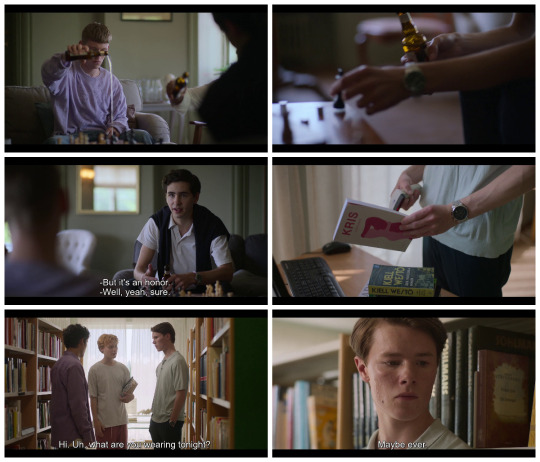
Culture: Vincent and the boys are pouring one out for Hillerska. It's a way to toast a dead friend, or in this case, a place.
Blink and you miss it: August places a king chess piece on the table before telling his friends that he's Wilhelm's reserve and might be king someday.
Subtext: And he's still so blinded by the glamour of it, despite everything. Thankfully, his friends can bring him down a couple of pegs.
Blink and you miss it: While Wilhelm is returning Kris, the book from last season, the second book in the pile is a book by Kjell Westö, Den Svavelgula Himlen - Yellow Sulphur Sky. It's about a working class kid in Finland becoming friends with his upper-class neighbour family, and his struggle maintaining a relationship with the girl of the family because of their class differences. Slightly on the nose there, show.
Meta: Henry interrupting our boys at the worst possible time is just a running joke at this point. How many times has it happened now? Four times? Five? Read the fucking room, Henry!
Subtext: Last chance to have a party together, but also last chance to see Simon, "maybe ever". Oh no, we have to start preparing for a sad ending!
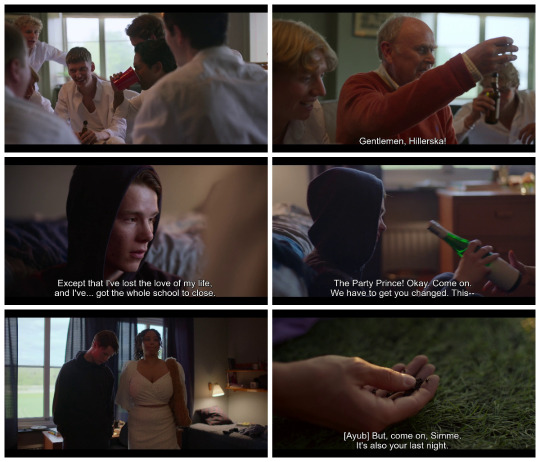
Culture: Red solo cups are not a thing anywhere outside the US really, but you can buy them as a gag gift in Sweden, because to us they're just a weird movie prop we've seen American movies. Every other party scene in the show has featured regular plastic cups.
Culture: Drinking with the teachers?!? Yeah, sure, why not, everyone is an adult.
Subtext: Emo outfit? ✅ Sitting on the floor? ✅ Full of self-pity? ✅ Exaggerating the catastrophic state of his world in the way only a 17yo disaster boy can do? ✅
Meta: Another throwback to how Wilhelm was referred to as the party prince back in season 1.
Blink and you miss it: Felice hides the wine bottle behind her back before Malin comes in. She knows, Felice. Malin knows everything.
Meta: Another throwback to when Wilhelm was eating the dirt at the very same football field that disaster emo boy Simon is now sitting at together with his friends, who are trying to convince him to go to the final party.
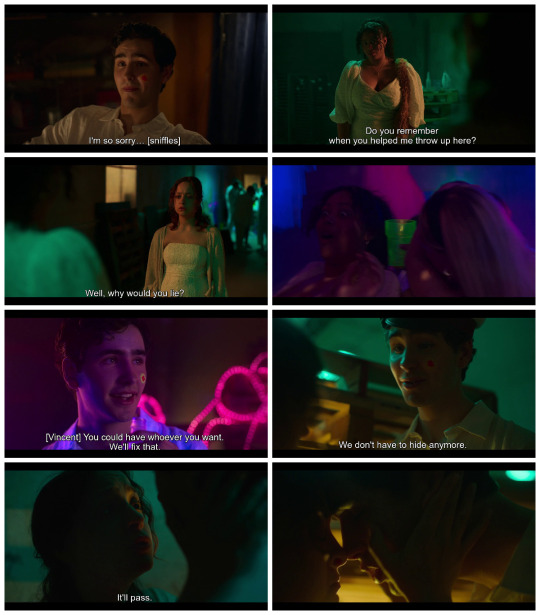
Subtext: This time, August isn't just sorry that he got caught, he is genuinely sorry for everything he did to Wilhelm. He in turn forgives August, and we're all getting closure for this plot point.
Meta: Hey, hey, hey guys, do you remember that scene in season 1 episode 1 when Sara helped hold Felice's hair while she was throwing up? We're doing a throwback here!
Meta: Hey, hey, hey guys, do you remember that scene in season 1 episode 3 when Felice told Sara that maybe you don't have to speak the truth all the time? Well, Sara still doesn't understand why you would lie, but this time she's right, Felice was right to tell the truth.
Blink and you miss it: Stella and Fredrika are making out at the party, Felice saw it, and is making a very funny face. This is also why Stella rudely rejects Rosh, because of course she's gonna choose Fredrika, Rosh was just a distraction to make her jealous.
Subtext: Vincent is talking about Nils, who just came out, but August just saw Sara, and that's the whoever he wants.
Subtext: But despite saying that he doesn't care about anyone else seeing them, he still ducked behind a stack of pallets for this conversation.
Meta: This is a brutal Fleabag reference.
Cinematography: This scene is overwhelmingly lit in that sickly greenish fluorescent hue, but there's golden light coming from somewhere, so Sara and August share one final kiss in that golden light. But there's not enough of it to go around, not enough for their love to last, so August is left standing there alone, and all the golden light is gone.

Cinematography: Wilhelm and Simon left the party sometime after midnight, this is supposed to be a very early morning summer sunrise, and our boys are just gonna be bathed in the golden light throughout the entire scene. Gods, it is pretty.
Meta: Hey, hey, remember that scene in season 1 when Simon was singing that song, and Wilhelm instantly fell for him?
Meta: Hey guys, remember that scene in season 1 when they were discussing welfare politics in class and Simon threw shade on Wilhelm? This is a throwback to that.
Cinematography: Just fucking look at this shit. What a nice view. The nature and the sunrise is pretty, too! Going naked into the water? Yeah, that's a rebirth metaphor as well. Lisa said so!
Subtext: This entire scene is basically Wilhelm trying one last time to get Simon back. They said they weren't gonna, but he's trying anyway. They're talking about that politics class where Wilhelm couldn't speak up because he was "not allowed". So he's still bound by his royal duties, which is why Simon broke up with him last episode.
Subtext: And since Wilhelm is still stuck, he's left on dry land, while Simon swims away from him, free. Guys, I'm thinking we're actually gonna get a sad ending! This does not look good! 😭
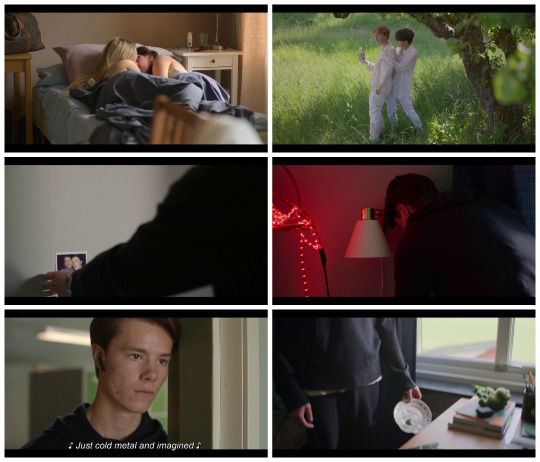
Blink and you miss it: Stella and Fredrika are sleeping in the same bed and making out the morning after, and millions of #Stedrika shippers are rejoicing! Yay, fanservice!
Blink and you miss it: Walter is helping Henry up after he passed out in the grass outside after the party, and millions of #Walty shippers are rejoicing! Yay, fanservice!
Subtext: The last photo Wilhelm takes down from his wall is the one with him and Simon, because that's the most important memory of this place.
Blink and you miss it: Wilhelm shuts off his red lightstrip in his room. Those lights have typically been a symbol of his love for Simon, but he's turning it off. Sad ending confirmed.
Meta: Listen, it's a lovely little song that Simon wrote for Wilhelm, but it's 100% fanservice, it's referencing events in the show that Simon actually didn't witness, and it's even referencing the soundtrack to the show itself! I mean, come on! And we're getting yet another sad boy Wilhelm montage of him moping around Hillerska with his earbuds.
Subtext: Remember how the frog snowglobe was a gift from Erik, who in turn got it from their grandpa, the king? It's so obviously a symbol of the monarchy, but Wilhelm is dumping it in the trash. Are we... Are we not getting a sad ending?

Cinematography: The shot of the flag being raised is cut off at half mast, which is a pretty universal symbol for mourning. Oh ok, we're back on track for a sad ending.
Subtext: This is the first time this season that Simon speaks Spanish with his mom, and the first time in the entire series that Sara does, which shows that they're fully themselves again, they've pulled themselves out of the Hillerska world.
Culture: The graduating students are having a champagne breakfast before the graduation ceremony, that's also very common in Sweden.
Subtext: Felice and the rest of the choir decided to have a little rebellion and not sing the boring old Hillerska song, and instead the new improved one that Simon made last season. No-one told him about the switch though, which is why he's so surprised.
Culture: After the ceremony, the graduating students will run out of the school to find their parents and family and friends, who are waiting for them, usually with a big sign with the most embarrassing baby picture they could find of them.
Blink and you miss it: August's mom and stepdad have also made a huge sign with an embarrassing picture of August Malte as a kid. Adorable.
Lost in translation: The queen is saying "lilla gubben", which literally means "little old man", a very common term of endearment in Swedish families. The show has been pretty consistent in that Wilhelm's family are all using normal words, just like any other family would. So it's pretty funny that despite everyone else using titles and styles all the time, to Wilhelm, his parents are simply "mamma" and "pappa", as if he was a regular kid.
Subtext: As a graduating student you get little gifts from your family, flowers, champagne, stuffed animals, all with a blue-and-yellow ribbon so you can hang them around your neck. August is family, so the Queen gives him one as well. Of a frog with a crown. Which is a symbol of the monarchy in the show. Wilhelm threw his frog in the trash, August is getting a frog from the Queen. I think there might be symbolism here! I think we're setting up August to become the next king! Do we dare hope for a happy ending?

Cinematography: Just fucking look at this shit. The composition, the contrast, the height difference, the distance between them. It's so pretty. And they're talking about how good it was while it lasted, just like how a TV show with a sad ending can still be an amazing experience. Hint hint.
Subtext: We're saying our goodbyes, Wilhelm and Simon are saying goodbye to each other, Wilhelm wishes Simon a nice summer, just like how Simon wished Wilhelm a good Christmas back in season 1, and just like back then, they both understand that they love each other, but can't be together.
Cinematography: And then Simon exits the scene, again, leaving Wilhelm standing there alone, again, having seemingly chosen his family and royal duty.

Culture: It's common to either rent a truck as a large group of students, or to be driven in a flashy car alone or with a friend. The two girls in the centre are sitting in a very nice Aston Martin, while a bunch of their classmates are on a truck. I can't make out the full text on the banner, but I think it says something like "Lock up your sons because tonight we become like animals".
Culture: Svensson is a very common Swedish last name, so to "be a Svensson" basically means that you're super average and mediocre, you're like everyone else. Whereas these elite kids are used to having everyone else bow and scrape for them, so that message is on brand.
Cinematography: We're in the car, it looks like the ending of season 1, and we're doing a close-up of Wilhelm's face. We're ready for the fourth-wall-break of him staring sadly into the camera, having been once again broken down by the system and not getting the boy. We've said goodbye to everyone, roll the credits, start your crying...
Cinematography: ...except the show isn't ending here. We're having an honest conversation between Wilhelm and his parents for the first time. Because every other time he's said that he doesn't want to be crown prince of the next king, he's been angry or upset, he's been threatening, and definitely impulsive. But he's never wanted any of it.
Cinematography: His parents let him go, they open the door to their van, Wilhelm exits, and the show turns up the volume of the soundtrack. "Energetic music" my ass, it's the Harmony theme! It's the main theme of the entire show playing as Wilhelm runs away.
Subtext: Oh, yeah, August sees him run away, and understands that he's next in line now. Sorry buddy, sucks to be you, but never mind that now. RUN, WILHELM, RUN!!! GET YOUR MAN!
Cinematography: The shows turns into the most perfect rom-com, with Wilhelm chasing down Simon's car through the incredibly lush and green Swedish summer. He catches up to them, tells Simon that he ditched the crown for his own sake, and asks if it's really over between them.
VAD FAN TROR DU?
As if the soundtrack wasn't triumphant enough, it now starts playing As Long As you Are Here as they throw themselves in each other's arms. Happy ending! They're crying, I'm crying, we're all crying! 😭

Cinematography: A montage? With all the best scenes between our boys from the entire show? With the text of the soundtrack perfectly matching the montage? I should be outraged at how cheesy this is, but it is perfect. Perfect. I love it. I swear, this fucking show.

Subtext: Finally we are at the true ending of the show. Wilhelm has managed to escape Hillerska, him and Simon and Sara and Felice have all escaped the hierarchies, the expectations, the duties, and the toxic environment of the school. He arrived in a Ferrari, and is now running away with his boyfriend and friends in a crappy Volvo station-wagon. The stiff suit jackets are gone, they're all in white, his hair is ruffled in the wind, and for the last time ever Wilhelm looks into the camera. And he smiles.
He is finally free.
139 notes
·
View notes
Text
On symbolism and improvisation
I've decided to post this separately because it might explain how I approach my substack analysis posts on 'Young Royals', but also how I approach film analysis in general. Maybe it'll be helpful or interesting to some of you. (And if not, then just ignore it.) This is my approach, basically. But there's obviously no right or wrong answer here.
I originally wrote this as a comment on the substack itself, but it's a question I keep getting both here and often in RL, as well:
Authorial intent is a difficult topic when it comes to films and TV shows, and it’s, of course, absolutely possible for something unintentional to just happen on set that doesn’t support the broader subtextual narrative of the story.
The interesting question in this context, however, is always: Why was it kept in? If an actor improvises something, is he encouraged by the director to do so? If so, it’s probably because the director realizes that the improvised part fits whatever metaphor, motif or broader symbolism the show has got going on. Another question to consider is: What actually makes the final cut? What improvised ideas just end up on the cutting room floor? Which are kept in? Does the editor think an improvised line fits the broader narrative? Does the director? What about the showrunner? Or the headwriter?
In the end, an actor’s moods and sudden inspirational flashes have to be treated like the weather. Sometimes the weather will change unexpectedly during an outdoor shoot, and then it’s up to the higher-ups to make up their minds: Do we have to stop filming? Or does the change maybe support some other symbolic puzzle piece of our story so that we can adapt to it? In short, there is always a decision to be made because, in essence, filming is decision-making.
Another interesting thing to consider is the fact that actors often make intuitive decisions about their characters that turn out to be right, without even knowing anything about the metaphorical subtext of the script. This is especially true about very intuitive actors. Edvin Ryding (who I think is a stellar actor, by the way) is both: someone who clearly knows his craft, but also an actor who has amazing intuition and can improvise lines and scenes that turn out to be spot on – a rare combination, especially at that age.
So, at the end of the day, the question of authorial intent will always remain unanswered. There will definitely always be viewers who’d like to err on the side of caution and who won’t read intent into something that’s essentially ambiguous. I just tend to fall on the other end of the spectrum: I belong to the If-it’s-in-there-it-means-something crowd.
33 notes
·
View notes
Text
SIMON'S STORYLINE SUCKED @LISA
wasn't she worried that simon was perceived as just a love interest in s1??? like his scenes without marcus or wille were him talking about marcus or wille. even the song. his arc doesnt even pass the bechdel test that is how much of a love interest he was this season. that same critic from last year is gonna eviscerate s2😭 if they can bear to watch the whole thing that is. I understand what she aimed to do with marcus but if it reduces simon (your second main and a poc character) to nothing but a plot device maybe you shouldnt have done it at all? never lose characters over storylines like did no one taught that in sweden? how can the same person write both seasons? i dont get it.
8 notes
·
View notes
Text

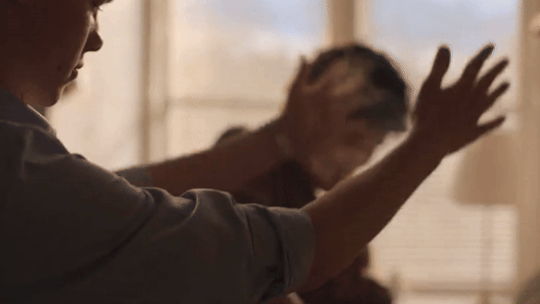
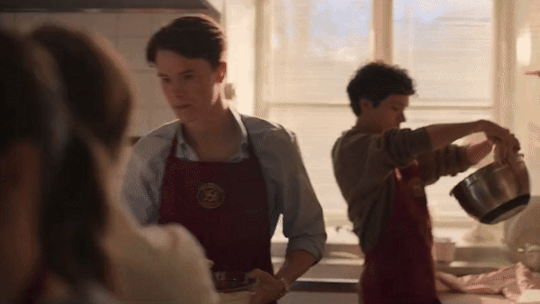
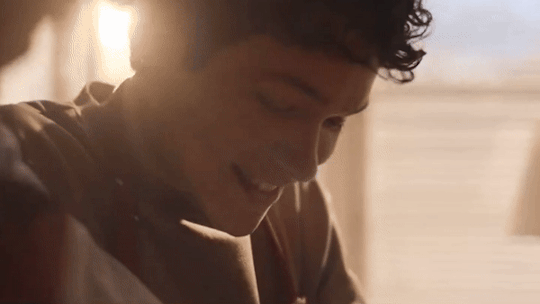
Baking with Wilmon ✨
#coming to your YouTube subscription box#young royals#wilmon#just wilmon things#wille and simon#young royals season 3#yr s3 spoilers#yr s3 stuff#I’m sure cleverer people than me can write something about the subtext here#anyway in another universe they have a baking YouTube channel but an aesthetic one with no narration only subtitles and beautiful shots
661 notes
·
View notes
Text
I'm so happy that Young Royals isn't letting things like Racism, Homophobia, Mental Health Issues, and Eating Disorders remain subtext. They're saying the words. They're not dancing around the seriousness.
1K notes
·
View notes
Text
off the cuff thoughts about the differences between being public and being recognized
Don’t hate me but I’m actually really interested in what kinds of delicious narrative tension Young Royals 3 is going to play with when it comes to the Wilhelm/Simon relationship not just being something that happens openly but something that is public. As in, a relationship that has a public presence and meaning, that is going to be consumed by the public in some way and evaluated under public scrutiny. As in something that the palace may attempt to curate and spin a certain way for the public eye.
In my mind, being “public” is different than just being “recognized” or just being “together” in a way that the people around you can see. In a show that’s a little more “slice of life” like Heartstopper (hate to use this as the contrast example but it was the first thing that comes to mind) there’s a lot of emotional stakes to Nick and Charlie calling one another boyfriends, and then being boyfriends in front of their friends and family. And generally it’s positive when they can take these steps of being more recognized by the people around them, because it allows for a lot more emotional honesty, self-expression, and self-acceptance. It’s also historically significant, given the way that queer couples in previous periods of history have at times been forced to live in the shadows.
For Wilhelm and Simon there’s emotional stakes to being recognized as a couple, especially as they try to reclaim agency for themselves in the wake of being violently outed. Yet Wilhelm’s position as crown prince means there’s going to be political stakes as well, and for that reason they can’t be recognized without also being public. And it feels very much like this emotional threads and these political threads are in conflict. Whether they like it or not, Wilhelm and Simon are symbols. I do wonder if Kristina and some of her associates at the palace will choose to openly support Wilhelm and Simon’s relationship, but also express a lot of opinions about how that relationship gets styled and posed in photo ops. The monarchy could want Wilhelm and Simon’s relationship to be a sign of their progressiveness, showing that they can adapt to the times while still remaining one of Sweden’s constants. But I admit I would absolutely devour a storyline where this is called out for the calculating PR move that it is, and not just written off as a message about cozy acceptance.
I also think it’s interesting how this idea of the public image of relationships applies to other characters in the show. Public scrutiny is something we think of affecting queer relationships a lot, but it impacts other types of relationships as well. So let’s go into the girls’ arcs for a little bit…
Felice is constantly under scrutiny for how people perceive her relationships to Wilhelm and August, and she is consistently negatively impacted by social expectations around female gender roles. People gossip about her being a gold digger when Wilhelm kisses her, for instance, despite Wilhelm initiating. Alternately, I think a lot about the shift between Felice and August’s initial hookup in 1.3, where Felice is in a bad place emotionally but at least has some agency in her anger and rage, and some of Felice and August’s early public appearances, such as when the headmistress expresses approval of them together and says August looks happier. There’s subtext here about Hillerska being the place where high status boys and girls meet one another to eventually marry, and about women managing the emotions of the men they’re in relationships with. And, what does August yell at Felice for? For not holding his grief for him when he’s sad about Erik, of course, and holding emotional space for Wilhelm instead. He expects her to be managing his emotions. This is not just August’s general toxic douchery (although there is that) but like, what adults and public expectations have socialized into him from birth. Now, Felice and August’s relationship was never going to be functional to begin with and it’s pretty damn dysfunctional in private, but that public pressure to behave according to certain roles made things even worse between them. It trapped Felice, too, because of the expectations that she act like a Good Society Wife to whoever she’s in a relationship with and not challenge him. That’s why Felice’s public instagram blast is so important. It’s not just a fun moment, but one where she stops playing the Nice Girl and says openly how fed up she is.
Meanwhile, in season 2, Sara and August’s relationship doesn’t have quite the same kind of dysfunction. But I’m really struck by the anxiety and fear that hits Sara during the scene in 2.4, when she overhears August’s phone call to the palace and the plans for the next ten years of his life. When Sara and August fight at the ball, we can see how worried she is about the idea of her relationship with August being under the PR microscope. Not just because she’s in a relationship with the guy who exposed her brother and was pretty shitty to her best friend (although, there is very much that) but because of the nature of public scrutiny in general. Sara is already looking ahead to the endless slog of press conferences and curated social media feeds, and she knows August wouldn’t be able to protect her from that because he is the reason she’d be getting that attention in the first place. Wilhelm wasn’t able to protect Simon, after all. She’s also got her eye on how the threat of attention is affecting August, making note of how he’s turned to unprescribed ADHD medication to stay on his feet. I think it’s incredibly smart of Young Royals have the canonically autistic and ADHD character be so aware of the psychic toll it takes to present a public persona, and to recoil from that horror when it’s offered to her by the person she most desires. (I also think that’s exactly why an AU fic where Sara ends up in that public princess-consort-to-be role would be so damn interesting. I don’t think we’ve seen that kind of story with an explicitly AuDHD character and I would honestly just be fascinated.)
To bring this back around to Wilmon… I do not want to ignore the historical significance of a queer prince having a recognized queer relationship, and I do think that is something that can come with moments of joy and happiness that I will enjoy as an audience member. At the same time, I think given what this show has chosen to say about relationships serving a public function, especially in ways that reinforce the class system, I am practically salivating to see what kind of commentary we will get about how this relationship gets packaged for the public. What kind of PDA is acceptable to the press? What terms are Simon and Wilhelm allowed to use to refer to one another in interviews? What kinds of places are they allowed to be seen together? What hobbies can they pursue? What colors is a queer prince allowed to wear? Is the pink sweater Wilhelm’s sign of rebellion, or was it imposed on him by stylists because they thought it made him approachable and quirky and accepted by his parents, and Wilhelm found himself liking it in spite of the imposition? Does Simon feel he can reclaim a sense of his own image, or does he feel like he’s being curated into something he’s not? What if Simon’s ideas for his future conflict with those of the palace’s? What then? How do they find their real relationship with one another when the people around them are always attempting to craft one?
I also wonder what our role will be as audience. We have been watching Simon and Wilhelm’s story for three seasons now. Will the show challenge some of our assumptions about true love and authenticity? Will it call us out for our voyeurism? To what extent are we complicit with the public scrutiny that governs the lives of Hillerska students and the upper classes? I am so curious to find out what season 3 has to say about us, even if it takes the form of criticism we aren’t expecting.
78 notes
·
View notes
Text


I love the way this show isn't just hinting at the problem or like just keeping it in the subtext. I love how they are speaking up I love how they are using the terms for the stuffs that happen to people. like Sara and her father's adhd, Wilhelm's anxiety... these are so so important. and young royals is doing it all. I love them for this
42 notes
·
View notes
Note
What young royals has meant to me, where do I even start???
It led to queer discoveries vs gender and sexuality, to community and wonderful friendships!
It led to learning cinematography and analysis of subtext, which has given me a whole new way of consuming visual media!
It led to rediscovering fanfics and through that learning so much from perspectives i've never found in published literature.
And it led to writing fanfiction, after feeling like the language of romance was sucked out of me by an abusive ex.
Young Royals and the fandom have helped me through a very hard time. I'm eternally grateful to both the show and every single one of you! 💜💜💜💜
💜✨
24 notes
·
View notes
Note
Idk if this is interesting but since you brought up the French versions tu/vous situation: in German ganondorf straight up uses the royal "you" for rauru where you refer to a person with the plural pronoun and calls him your majesty and such, while rauru also uses the informal you (du) and his first name for him. Which kinda had me shocked, because in fantasy media kings usually refer to each other with the royal you! It definitely felt disrespectful. But also in the German version ganondorf says, roughly translated: "we ask to be allowed to return (to our place) under the umbrella of the kingdom hyrule, if you'd allow us this grace." So here it's implied the gerudo used to be a vessel state and freed themselves, and STILL he gives them "repeated invitations "??? It's soo off-putting
Hey, thanks for the ask and the absolutely wild input!!
So I did a post a billion years ago detailing my feelings about the french translation of the Show of Fealty scene, its tl;dr being: it's wild they decided to go for the the tu/vous distinction because it just adds 26 layers of subtext to the entire exchange --and I don't know how this works in german, but using "tu" on a fellow adult during a show of power definitively has racist history if the context does apply (and here it's pretty hard not to see colonialist accents to the whole situation).
But it's absolutely buckwild that they gave the gerudos this notion of previously being a vassal state? but like when???? when did it happen, was it all... extremely recent history? like did Zelda just dropped at the end of some sort of unification war, where Ganondorf became a hero of his people for..... very concerning reasons? Like did they need a hero *in that context*?
(cue I need a hero etc my brain will now be haunted for the next day or so)
Like... I don't know I'm sorry if I go a bit insane, but I feel like the implication is either that Hyrule was founded in 10-15 years, given Sonia still looks pretty damn young, mid-thirties at most; or that Rauru/Mineru were trying to handle everything for far longer, and Sonia was a late addition to the picture? And so, in that time, they managed to convince everyone to do a kingdom about it --and that would mean the gerudos had time to either join first/be conquered first, and then revolt, and then join again? Like was Ganondorf forced to submit a first time as a younger king, and then return later with a Molduga army, zero-ing in on the Secret Stones, and then going all Demon King???
Yeah, from what I've seen from literal translations, that seems to be a german exclusive (unless I'm mistaken? let me know!) But it's pretty wild how such small changes in translation literally change the game's fabric and the story it tells.
#thoughts#asks#totk#totk critical#rauru#zonai#when will my brain return from the imprisoning war...#thanks for the ask!!#yeah truly this scene is.... so much#like it's not even particularly well written#(on top of being oot fanfic)#but it's the most packed with any hope for subtext and depth#so#returning there often#ALSO the timeline of events from the zonai perspective is completely opaque like what happened when!!! how old are you!!!!#“tloz and fucked up timelines that make no sense” name a more iconic duo
58 notes
·
View notes
Text
Subtext and Culture, Young Royals, Season 3, Episode 2
Episode 2 starts days or maybe a week after episode 1. The curfews and phone ban is in place, so Wilhelm and Simon make the most of their one hour of phone sex talking.
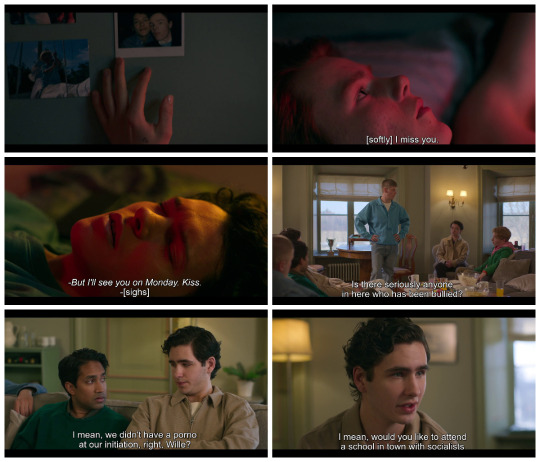
Blink and you miss it: Wilhelm snapped a quick instant picture of himself and Simon at the palace in the last episode, using the camera we saw on his desk. The heart is still on his hand, so maybe it's the next day, or maybe he's been filling it in every day.
Cinematography: Intense red light typically symbolizes their mutual love, and this scene is overflowing with it.
Lost in translation: They both finish the phone call with "puss", which means kiss, but not exactly. It's more platonic, something you can say and do with your parents, or your kids, or end phone calls with. The other word for kiss, "kyss", is more romantic/sexual, and would be super weird to end a phone call with. Simon is using that word when he says he would kiss Wilhelm's collar bone birth mark.
Subtext: Of course Vincent doesn't believe anyone was bullied. He's the biggest bully, but what he does is just a joke, or the other guy deserved it. This is gonna be a recurring theme™ in this episode, how various characters look back on and remember, or choose not to remember, what happened to them.
Subtext: If you didn't pick up this meaningful glance, you're blind. The initiation porno was totally real, and Nils and August clearly remember it, and weren't as flippant about it as Vincent.
Culture: In Sweden, inner city schools are typically better and have richer students than the poorer schools out in the suburbs. This is the exact opposite of the typical US school demographical pattern.
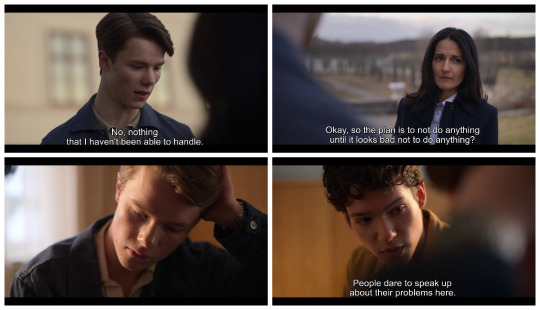
Subtext: Wilhelm avoids Farima's question by evading it. Note that it does make sense that she doesn't know what's going on at these schools since she's an employee, she's not upper-class herself. Wilhelm's parents know though since they attended Hillerska, but they would of course never admit it either.
Culture: Ironically, this is exactly how the real-world Danish royal family handled the Herlufsholm scandal in 2022 involving prince Christian. Only when the media storm in Denmark got too intense did they pull him out of the school, while furiously denying knowledge of the abuse or that he was involved in any way.
Cinematography: We're in the cursed music room, but the light is soft and golden, and the scene is just cute. No fight this time.
Subtext: We're touching the theme™ again, but from Simon's perspective. He has the same outsider perspective we have; speaking up about abuse is always good, and if the school's closing because of it, that's an obviously good thing. There's plenty of scenes in this episode showing that most Hillerska students don't share this perspective, they really love their school, as fucked up as it is.
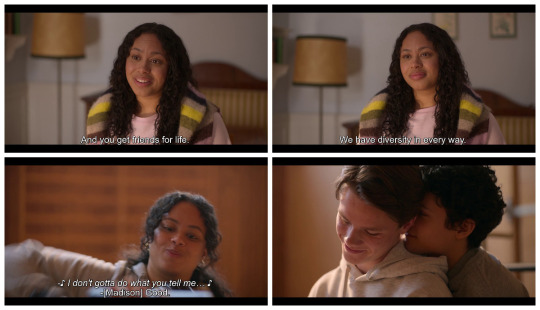
Subtext: Although it sounds like a rehearsed PR line and Felice is thinking about her girl group here, it's gonna come true for her and Sara.
Subtext: Yuck. No further comment.
Cinematography: The immediate cut to Felice getting her aggressions out in gym class shows us exactly what she thought of what the principal said and how much it pissed her off.
Blink and you miss it: Simon audibly sniffs Wilhelm's hair.
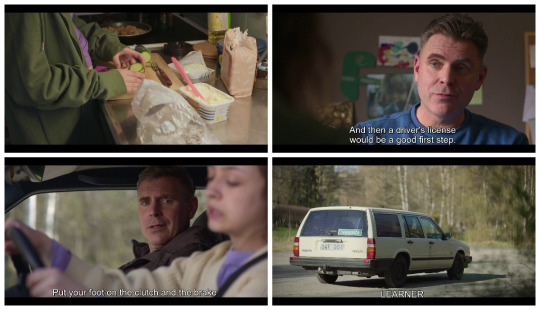
Blink and you miss it: Micke made dinner for both of them, but in her depression, Sara ignores the cooked food (Pyttipanna, btw), and makes herself a cucumber sandwich instead.
Subtext: Micke is a man on a mission, and he is constantly steering the conversation towards helping Sara get her driver's license. For him, it's a way to make up for having been a shitty parent.
Culture: Sweden has long been a holdout of stick-shift cars, and if you don't do your practical test in a stick-shift, you'll get a restricted license, so it's not out of the ordinary for Micke to be teaching Sara how to drive one. However, automatics have seen a sharp rise in the last decade, and in 2024 automatics will finally overtake them.
Culture: The green ÖVNINGSKÖRNING sign is compulsory in Sweden if a car is being driven by someone on a learner's permit, with a parent or friend as the instructor. There's also a red version of the sign, which indicates it's a student driver with a professional instructor in a dual control car.
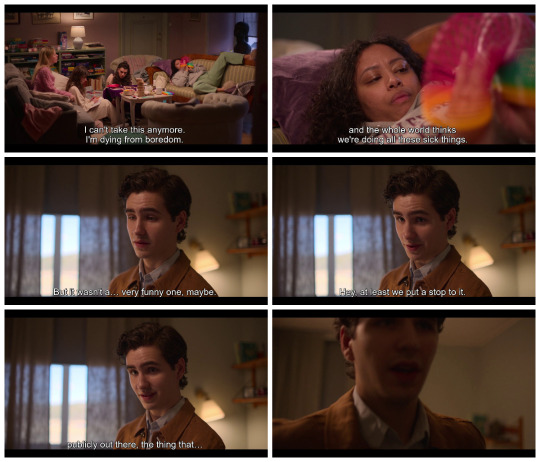
Cinematography: The room is filled to the brim with things to do, there's a bazillion board games, they have books, magazines, fidget thingies, they're drowning in stuff, and yet the girls are still soooooo boooored just because they don't have their phones. Except Madison, who is knitting.
Subtext: Here comes the theme™ again, and Fredrika is firmly in camp denial. Everyone else is just lying and exaggerating! The wheels are starting to turn in Felice's head though.
Subtext: Nils and August are finally talking about the initiation without Vincent being present, and they can finally be honest about what they actually thought about it. It happened, they didn't like.
Subtext: Their idea of fixing it however is not to go out publicly and talk about it, but to just quietly stop the tradition, hoping they'll be the last ones. (Since there are no second-year students in the show, we have no idea what happened to them, so we're just gonna ignore that.)
Subtext: And here comes the reason that August wanted to put a stop to it. He was completely humiliated by it, and he doesn't want anyone else to know that he was humiliated, because that just makes it worse. This is also the reason that traditions like this keep on going, no-one wants to blow the whistle on it, because everyone was abused, everyone was a victim, it's hard for abuse victims to speak up.
Cinematography: The talk with Nils triggered an anxiety attack for August, and being inside his small room doesn't exactly help. Him going so close to the camera that he almost bumps into it really shows how he feels like the walls are closing in on him.
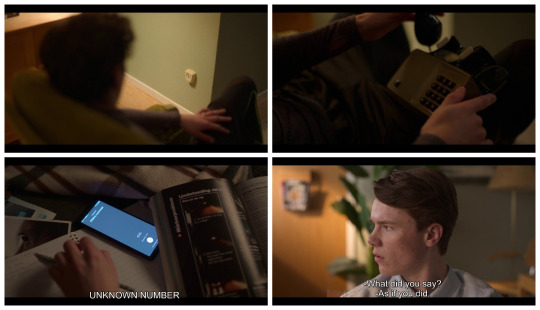
Culture: This, kids, is a standard Swedish landline telephone jack. For the longest time I thought phone jacks looked like this everywhere, but it turns out that this particular design was only used in Sweden and Iceland(!?!). You won't find these in newer buildings because landlines are pretty much dying out, and if there are phone jacks they'll probably be using the much more common RJ-11 standard.
Culture: This, kids, is an Ericsson Diavox phone. The former government phone monopoly in Sweden, Televerket, only allowed certified and approved phones to be used on the network, and they only approved a very small set of phones, so everyone had pretty much the same phones in their homes. However, in the 1980's the market started getting flooded with "illegal" phones from other countries, so the monopoly simply stopped enforcing the rule, and you could finally, finally, plug in that novelty Garfield phone that you always wanted.
Blink and you miss it: Sara is studying for her driving test, and she's reading about driving in the dark.
Subtext: We're gearing up for the main plotline of the season, dropping more hints that maybe Wilhelm's image of Erik wasn't complete, and what August says sows some seeds of doubt in him.
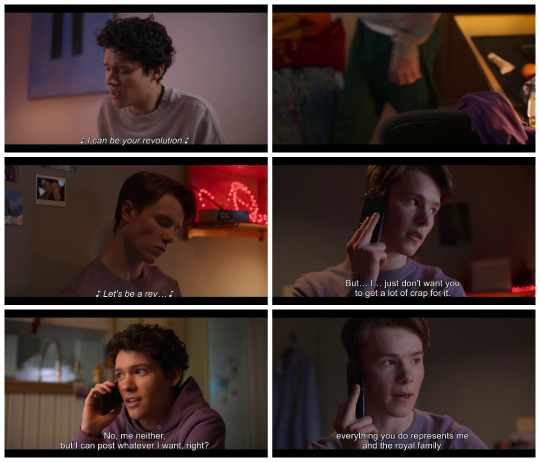
Subtext: This song is objectively not very good, please don't kill me, but it is very sixteen-year-old-boy-just-singing-from-his-heart, not thinking about the text.
Subtext: Simon isn't wearing anything purple, but just after he posts his song video, he picks up a purple shirt, drops it immediately, and then the camera lingers on it. Colour theory goes brrrrrrrr. He thought about Wilhelm, and then stopped because his music is more important to him or something?
Subtext: Unlike Simon, Wilhelm immediately understands how problematic the text is for him, and how people will interpret it...
Subtext: ...but since he doesn't want to hurt Simon's feelings, he lies about why he thinks the song was a very, very bad idea. And he cushions it by telling Simon that he thinks the song is jätte-jätte-bra. Giant-giant-good.
Subtext: Yes, but also no, and someone from the court really should have given Simon some media training and explained to him why he has to be very careful about what he posts. But it's drama fuel, which is why this disaster is allowed to happen.
Subtext: A nice little throwback to season 1, this is exactly what Erik told Wilhelm in the first episode, about making sure that their public image is carefully curated.
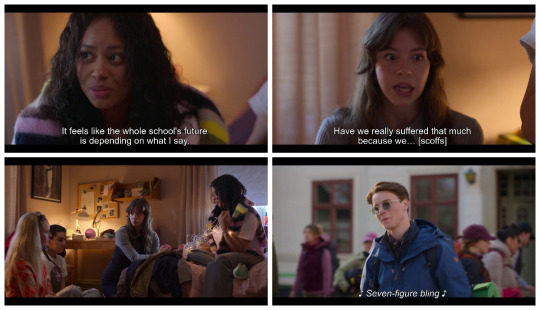
Subtext: That's some on-the-nose foreshadowing there, since Felice is one of the main causes for the school ultimately closing.
Subtext: We're back to the theme™, Fredrika is saying pretty much the same thing as Vincent. It didn't happen, and if it did, it wasn't that bad.
Subtext: However, Felice isn't playing along this time, she's starting to speak up about the issues, and the result is a long, awkward silence, because her friends are not willing to do the same.
Subtext: Wilhelm and the rest of the rich kids are of course all wearing pretty expensive high-end hiking gear, in contrast with Simon who is simply wearing one of his usual hoodies and his usual winter jacket that we've seen before. That's a damn fine jacket from Fjällräven, btw, the same company that makes the weirdly globally popular Kånken backpacks.
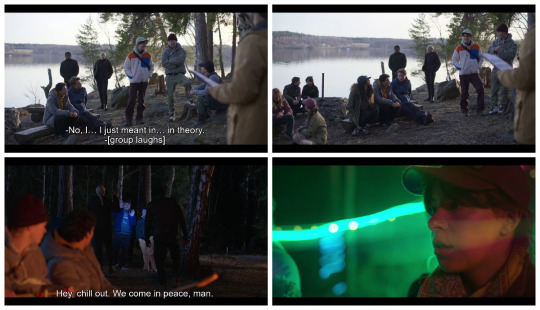
Blink and you miss it: Henry is getting dragged for his actually quite reasonable objection to the tent groupings.
Subtext: Felice physically distances herself from her friends, and joins Simon and Wilhelm, in a nice little foreshadowing of the show's ending.
Blink and you miss it: Did you miss the line in last episode where Ayub said they were also gonna go camping at Talludden with their classmates from Marieberg? Well, here they are, because they pitched their tents nearby, and decided to go check out the Hillerska camp. It's not just Rosh and Ayub randomly walking through the woods.
Subtext: In season 2, we learned that Stella has a crush on Fredrika that she thinks is one-sided, but Fredrika sure has some kind of reaction to seeing Stella being close with Rosh. Jealousy, perhaps? Not clear at this point in time.
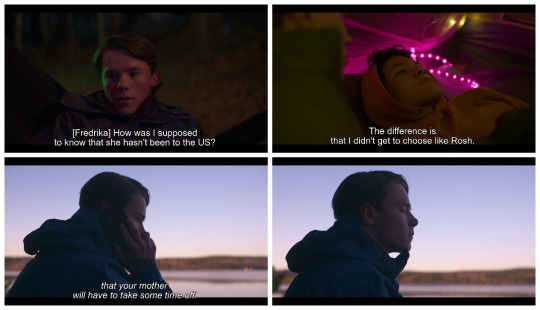
Subtext: Read the room Fredrika, for fuck's sake. At least Wilhelm has started learning to recognize privilege. The other rich kids probably recognize their privilege, but they're mostly just enjoying how much better they are than the poor regular kids.
Subtext: But Wilhelm's still got a lot more to learn. Yes, technically he is forced to spend his summer studying, and technically it is a kind of work, but the underlying reasons are completely different. If he skips it or fails, nothing bad will happen to him, unlike the Marieberg kids who rely on their summer jobs to have any sort of spending money.
Lost in translation: Wilhelm's dad says that the queen is going to be "sjukskriven", which is more serious than someone deciding on their own to take some time off or to use some sick days. It means that a doctor has evaluated you and decided that you are not fit to work, and that if you're a regular person, you are eligible for sick pay for the foreseeable future.
Cinematography: Yeah, mommy is really sick and Wilhelm is feeling the weight of responsibility, but take a look at that sunrise! It's so pretty! Wilhelm is completely in shadow because trouble whatever, but look at how that light just pops, with the sky and the water and the sun on the trees! Beautiful!
282 notes
·
View notes
Note
Hey hey :) I just wanted to let you know that I love love LOVE your analysis (all of them!) on Young royals. It's so well thought through and well written with humor and detail, and I've learned so much from reading them.
I was just thinking if you ever thought about doing an analysis about the topics of hands ( - and touching, like in Wille dream in s2e1 hands play a major role and to calm his anxiety in S1 as well... ) and another about the topic of lighting, light versus darkness (like the sunlight in the morning after scene in S1, the kind of darkness when they first kiss in S1 as a representation of staying hidden, a secret...).
I don't know if there is even anything to analize to be honest or if I'm just too lost down the rabbit hole for this show. Haha. 🙈 I'm not as good in spotting things as you are!
Anyway, I just thought I'll message you. No pressure of course, just wanted to ask if you're planning on or thought about it... Sorry this got longer than I planned to.
Once again, thank you for all your amazing work! I hope you have a nice week! 😊
Hey, I hope it's okay if I answer your ask publicly instead of privately? (I just thought some other people might be interested in my answer, as well.)
Anyway, sorry my reply is coming so late. I'm a bit overwhelmed with all the reactions and comments I'm getting right now.
But thank you so much for your kind ask. It really means a lot and motivates me no end.
As for your question: While I haven't considered writing anything about the lighting specifically (I feel most of it has probably already been written at some point, and you're making some really good points yourself in your ask!), it might come up here and there in a half-sentence. But no, I don't have anything specific planned in that regard.
I do, however, want to write rather extensively about that dream sequence in a really freakishly long post I'm planning to write about the sexual subtext of this show. So far I haven't written a single sentence of it, but it lives rent-free in my brain, so it'll have to come out eventually even though I'm still a bit unsure about how to proceed down that avenue. Writing about sex in a context of a show that's about teenagers should be done very, very carefully and respectfully (if at all). None of us want to be August, after all. On the other hand, the writer put the subtext in there for a reason, so pretending it's not there, I feel, would just take away from our film analysis experience and leave some very interesting and enlightening subtextual hints unexplored.
So, basically, watch me struggle with this for another couple of weeks and then at some point in late summer I will probably manage to write it all: the hands, the dream, the everything...:D
Thank you again for your ask. I was feeling a bit down in the dumps yesterday (writing-wise) and needed some motivation and then suddenly the comments and the asks started to come in and made me smile. Yours in particular.:)
15 notes
·
View notes
Text
Something ironic is that even though 3H is a massive game with a very strong and consistent creative fandom, I have had no creative spark with that game beyond discourse lol.
Of course, my type of creative output is different from most people's; I like reading into things, analyzing dialogue to recontextualize characters as a whole, look for real world analogies, hypothesize potential non-canon interactions, etc.
E.g., the Nohr siblings and their relationships with their father, with each other, or the court is never explicitly laid out in detail as to what happened. At best, you get basic extrapolations such as "we were told not to talk to Azura" or "our mothers used us as tools to curry favor and to sabotage/hurt one another."
Put those backstories and character traits against events in the story? It makes you think. Elise, Leo, and Camilla are stressed tf out and panicking over Xander and Corrin's fight during chapter 2, cuz siblings hurting each other = one's gonna die to them. Corrin choosing Hoshido or even siding with neither kingdom is a strike against Xander's ego and his built up sense of normalcy as a stoic fraternal unit trying to hold together the last remnants of his family. Camilla intertwines violence and love because she was raised receiving love and affection from her mother only after being subservient to her mom's terrible actions towards the other concubines and royal children. Leo is on Forrest's case at first because he has his on warped sense of "bringing shame and dishonor" to his family, an amalgamation of his loneliness when the other sibs focus on Corrin despite his own accomplishments and his mom most likely drilling it into his head that he has to be talented to be an honorable prince; it's little wonder he lets up on Forrest when he sees his son doing something noble and selfless like healing and attending to an entire town. Elise is an outlier because she's so young, and that either manifests as reckless, well-meaning bravery, or blubbering, immature outbursts draped in ignorance; she knows nothing beyond her supposedly good family unit other than what's been told to her second-hand, so how is she supposed to react when the rug is pulled from under her?
With 3H I don't get that kind of stuff, partly because the game is just that packed with dialogue and auxiliary comments from characters (IMO, a big reason why things seem bloated), and partly because of the way the story is delivered; since Byleth is a silent protagonist, character dialogue seesaws between having a conversation and telling/expositing at you, which results in a restrictive writing style that's actively harmful to implicit writing or subtext. There's nothing to scratch your brain about, because the game pretty much does that for you. And while many think having characters comment on story events each chapter in Garreg Mach is a positive to world building and narrative depth, I actually think the opposite, because the medium in which this dialogue and insights are given-talking to them with a silent protag who can't ever have an actual conversation-feels like I'm a scientist putting variables against each other and extracting data and information from the results, rather than a story with believable characters with lives, dreams, and relationships.
...Though, writing this out, maybe that's why it's appealing to other creatives. Maybe it's the equivalent to getting a 2,000 piece lego set, and switching only a few things around without dismantling the entire base project. The product itself is seen as art that can be altered in specific, minute ways that inspire curiosity and creative reaction.
I, on the other hand, get the most fun out of thinking about why the pieces fit together in the first place and how well they do in practice. Different strokes, I guess.
40 notes
·
View notes
Note
Saw your reblog and mate if you got queer visual novel recs I got spare time that needs eating.
If you´ve come for gay furry visual novels, this is certainly a place with recommendations
Assume NSFW, Unfinished, and free unless otherwise specified
Adastra – get kidnapped by handsome space wolf and become involved in political shenanigans. The one that least needs an introduction – COMPLETE!
Astatos – A pair of mages (kind of) lose their home, summon a god and a devil, and help solve various political issues using card game mechanics. The queerness of this one is pretty heavily constrained to subtext, but there’s no doubt that all major characters are hot men in various states of undress – PAID, SFW
Chardonnay Romancia – Innkeeper who hates heroes discovers an amnesiac hero who quickly becomes obsessed with him, among many other subplots. The characters find themselves in many explicit scenarios, often enough against their will – PAID
Deers and Deckards – As a college student, get into a relationship with either your best friend, his dad, or both. Also, at some point the game decides it becomes tired of its light-hearted tone and takes a dip into a more supernatural setting. Currently, only the polygamy route is complete.
Demons Within – You play a demon of lust influencing the emotions of a soldier and those around him, attempting to assist your host while also growing your own power and keeping them ignorant of your existence.
Devil’s Gambit – A doctor reunites with an old friend, uncovering a supernatural mystery and kicking off a strange romance.
Glory Hounds – A young man finds himself with an unexpected employment opportunity: becoming a sidekick to a superhero.
The Human Heart – Wake up as the only human in a familiar world and find yourself adopted by a colorful group of friends – SFW
In Case of Emergency – Find yourself as the last of the chosen ones in gay furry Narnia and awkwardly ingratiate yourself into the longstanding group of heroes – COMPLETE!
Kingsguard – When things go to hell at your royal birthday how will you reclaim your throne from the magical forces trying to take it from you and, more importantly, which of your kingsguard will you fall in love with
Minotaur Hotel – Discover the true story of (and also fall in love with) the Minotaur of legends and turn his crumbling home into a home for the lost. Even among visual novels, this one is a slow burn, but it’s absolutely worth it
My Pirate Husbandos – Get rescued from drowning at sea by a crew of rowdy, and very gay, pirates, and help them until you earn yourself a place among their ranks
Nekojishi – Become forced to face an uncertain future when you suddenly awaken the ability to see spirits and find yourself fought over by three handsome cat men who each want you to become the priest of their shrine (or equivalent) – SFW, COMPLETE!
Orveia – Awaken in an unfamiliar and horny world along with your best friend (who somehow arrived about a decade before you did) and several handsome men to become an adventurer. This game contain heavy RPG mechanics
Pervader – Discover your kindly DILF of an employer is a wizard and get infected with “becomes a wizard” disease along with the heir to an order of knights whose primary goal is to stamp out all magic
Shelter – Become enraptured in a strange world of medieval fantasy dogs, and protect your home in a world that wants to take that away from you
The Smoke Room – Learn to trust again in the wild west in 1915 after a man you though loved you tried to kill you, while the world itself seems to want to drown you in your guilt
Temptation´s Ballad – A young rogue trying to live up to his father, a commoner with an obsession with adventuring, and a sheltered chosen one looking to broaden their horizons form an adventuring party by happenstance and find themselves with a quest far larger than any of them believed
#gay furry visual novels#gay#furry#visual novel#gfvn#adastra#astatos#Chardonnay Romancia#Deers and Deckards#Demons within#Devil's Gambit#Glory Hounds#The Human Heart#In Case of Emergency#Kingsguard VN#Minotaur Hotel#My Pirate Husbandos#Nekojishi#Orveia#Pervader#Shelter#The Smoke Room#Temptations Ballad
26 notes
·
View notes
Text
[ personal sharing time ]
beyond all the character/narrative reasons for Ichigo to live a full life, I have a very personal/political/professional (cannot dissociate the three) appreciation for the fact that he does not join the Gotei - nor any organization, for that matter.
I know Kubo draws mainly from Buddhism, and I don’t think he’s worried about political organizations at all, since his message is about self-realization. However, as he takes us through Ichigo’s journey, he does take us through different political arrangements, meaning, organizations of violence: oligarchic and militaristic regimes, colonialism/imperialism, theocratic and totalitarian ideologies, you name it. For instance, I think Kubo said somewhere he chose the spanish/latin motif to Hueco Mundo and the Arrankar/Hollowfication stuff because he thought it sounded sensuous, which makes sense with the uh... subtext of it all, BUT, the predatory viciousness of Hueco Mundo is such a strong colonization subtext too!. Also, expropriating a population/territory (Karakura) to literally fabricate and access sovereignty (the Royal Key)... wow. Then you know, don’t even need to get into Ginjo literally stealing powers, or everything about the Wandenreich.
But the most important “organization of violence” here is not the one that imposes one’s will onto another, but the individual one that informs human agency and autonomy. Ichigo happens to have all the available types of power in his hands, he has a lot of means to inflict violence, but he gets to learn how to use them to be his own person.
No gods, no hierarchies, no masters but himself.
When we’re kids, we’re vulnerable. Things happen to us, and we are powerless. Then, as we grow up, we gain physicial strenght, we get the chance to walk on our own, to actually do things, to be active - we get access to power, including, to do things to others. When we start Bleach, Ichigo gets this immediate power boost in his life and we see him fighting the world: he chops off Sora’s hand, he chops off the serial killer hollow and he is angry, he’s brutal, he’s violent - as we see even more clearly in the whole hollowfication journey. A journey that, beautifully, comes to its closure when he finally learns the truth about himself, stops trying to supress it, and learns how to use it, how to regulate it, and once he relies on Orihime. Which brings me to the next part.
Growing up right beside him, we have the development of three other young people, each one relating to particular aspect of his own powers, dealing with violence too: Chad is a window to racial violence and learns how to fight back on his terms, Orihime is a window to gender violence and learns how to fight back on her terms, Uryu is a window to genocide and learns how to fight back on his terms. And they are also helping and being helped by Renji and Rukia, two people who have been hurt by class opression and nobility dynamics, who also found their own way to make it work - the “we gripped each other’s hand instead of the blade” is very important to lil old me.
In a world that is terrible, but also full of possibilities, Ichigo and Karakura are (to me, this is a personal take) an amazing ode to human agency that is informed by self-improvement, desire to help, to care and protect more than any disciplinary power out there, and I love that for them.
#bleach appreciation#ichigo kurosaki#six hearts beat as one#karakura gang#this is also my way of saying why i firmly believe karakura gang are a married poly#when they die then we'll see what happens (rukongai revolution or hell uprising? I'll be there for it)
99 notes
·
View notes
Text
Earlier today I alluded to the fact that Young Royals has some interesting stuff to say about heterosexuality. Let me elaborate.
One of the many intriguing moments in Young Royals season 2 (in my mind, anyway) is the phone call where Jan-Olof asks August a lot of questions and ends with the question “Are you heterosexual?” To which August replies that he is. It’s only ever been girls! (I think that’s how the line goes, anyway.)
What intrigues me about this is the way it puts the emphasis on heterosexuality as a label—or, to put it more colloquially, on the idea of being heterosexual as a “thing.” After all, the whole notion of being straight or hetero is a fairly recent one in human history. The word heterosexual hasn’t been around too long, first appearing in German in 1869 after being coined (along with the word homosexual) by Karl Maria Kertbeny. In the late 19th century, western culture saw a shift in how people understood sexuality, and people started describing sexual orientation as more of an identity thing (who you are) than a behavior thing (what you do.) If Wilhelm’s family has been on the throne at least as long as the IRL Swedish monarchs, then the current Swedish monarchy in Young Royals predates the ideas of heterosexuality and homosexuality. The Swedish monarchy as an overall institution definitely predates heterosexuality as a concept. Social constructs, baby!
That said, Jan-Olof, the show’s keeper of tradition, still asks August if he’s straight. What he’s really asking, given the uncomfortable reproductive subtext of the conversation, is whether August is willing to produce a legitimate heir to keep the monarchy going. This is interesting because of the way it conflates heterosexual identity with reproduction. We know there are plenty of straight people who choose not to have kids and use various contraception methods to prevent pregnancies from happening or being carried to term. (Heck, August and Sara themselves have a whole conversation about condoms.) We also know that there are plenty of non-straight people who have biological kids. Ultimately, straightness doesn’t matter for that kind of thing! And yet, by including a question about heterosexuality in a series of questions that’s really about reproduction, wrapped in an even longer list of questions about fitness for the throne, this conversation is putting forward the notion that heterosexuality isn’t just about sex and romance. It’s also a political stance.
And that’s… that’s kind of fascinating. Usually it’s queer people who are said to be inherently “political.” Straightness, of course, is just as political. It’s just that no one calls it that. So I’m struck by the reversal of that dynamic in the show.
I’m also struck by how August’s heterosexuality is a matter of attraction, performance, and labeling, and each of these is addressed separately and a little bit differently by the writing. We know he has heterosexual attraction toward Sara (and possibly Felice, depending on how you read that relationship) based on the fact that he has ~those kinda feelings.~ But there’s also the public performance of heterosexuality, where we see August hitting on Felice in a very overt and aggressive way. In those moments, August’s performance of heterosexuality becomes an expression of power and privilege. This is further reinforced by some of the crude sexual jokes he makes about women. Even the softer stuff toward Sara puts him in a protector role that lines up with gender roles by the end of s2. If the performance of heterosexuality is an attempt to claim power, then what does claiming the label of heterosexual mean? I think perhaps we’re supposed to see it as August declaring his alleged right to power, within this particular social system where heterosexuality means something specific.
Labels can confer power on a person by giving them the power to define themself, but labels can also be limiting, in a way. August is, for the most part, straight in terms of his identity, behavior, and personal politics. He’s willing to claim the power and privilege that straightness gives him. However, there are times where his heterosexuality gets a bit fuzzy around the edges. That time where he’s (fakely) singing Simon’s praises and out of nowhere kisses him on the forehead comes to mind as kind of a weird moment. Like, where did that come from, August? The fact that August has watched the video of Wilhelm and Simon a few too many times also hasn’t escaped fandom’s notice. Finally, the fact that August labels himself as hetero in a scene where he’s lying through his teeth about other things, and when the palace is trying to fabricate a perfect princely persona for him, really shows how much of a social construct sexual orientation labels are. They describe something real, but they can’t describe all the nuances of it.
My point here is not that August is some sort of hidden bisexual representation sleeper agent—he really isn’t! (Like I said he is functionally straight, and also these moments above still involve him behaving in aggressive and dysfunctional ways.) Rather, I’m more interested in the way August ignores his own fuzziness-of-orientation (however minute) when claiming the strict heterosexuality label, and therefore cuts himself off from the possibility of empathy for Wilhelm and Simon, as well as enlisting himself in a system where he wouldn’t really thrive. Sure, there’s lots of other aspects of his personality that play a role in this as well. But I wanted to talk about this one today, so I did.
Anyway, binaries are harmful and divisive and reinforce weird power structures. Regardless of our orientations, we would all do better if we all embraced a degree of queerness in the world and in ourselves, don’t you think?
(Hey, are there other characters in the series where you want me to talk about their relationships to heterosexuality? Let me know with an ask or something; I’d be happy to ramble.)
#young royals#my meta#august young royals#queer theory and media analysis#let’s study heterosexuality as a thing and not just as a default!#the straights are not okay
139 notes
·
View notes
Text
I love Ever After High more than I could probably ever say, but I’ll try in honor of its 10th anniversary.
I discovered Ever After High when I was maybe 7 or 8 years old, so I was very young, and I LOVED Disney Princess movies (kind of ironic given the history, huh?) and so I discovered the Brothers Grimm fairytales, and I adored those too. I find a series from a YouTuber I don’t remember the name of (7 Super girls? Or something?) And I think the video was “What’s your favorite show?” And the girl in the video explains what Ever After High is and that sounds AWESOME to a little kid like me. It was a high school for the children of the Brothers Grimm characters?????? AMAZING! Obviously not much was aid about the more,,grizzly details of the stories as this was a child’s doll line as well.
I started watching, and I instantly fell in love with Raven Queen when I saw what her whole deal was, also I really liked her style, as I was a little emo kid, and Raven striving to be herself in a world that didn’t accept that, that she had to just follow the rules that actively worked against her. That struck a little cord with me, and I wouldn’t realize it until many years later, but, spoiler! I’m trans. Raven is a character that, in general, means so much to me. I full person and soul mean this when I say she is my favorite fictional character of all time. Raven Queen meant so much to me, and others as well.
Ashlynn and Hunter because I ate, slept and BREATHED True Hearts Day as a kid, to see these two people that loved each other, so deeply and true that they were willing to sacrifice their stories for one another despite the danger. Society told the two of them their love was wrong, Ashlynn’s best friend even told her she thought it was wrong, and that crushed Ashlynn. She even broke up with Hunter over her fears about their stories, but also so everyone would just. Stop. The whole reason they even told ANYONE was because Duchess had threatened to essentially out them when they weren’t ready.
Then, after all of that pain, and trail and tribulation they got up, well Ashlynn did, she got up and she told the whole world that she loves Hunter, and doesn’t care what anyone, or their destines have to think. If she can’t love Hunter and be a royal? Then call her Ashlynn Ella the rebel!
Then as the years went on, I got older, and Dragon Games aired. I saw Darling Charming, a character I didn’t really care about too much until I got older, and I saw her give “CPR” to Apple White, a character I hated, and ALSO grew to love as I got older.
My personal feelings to these character didn’t matter, though. I saw these girls KISS on screen. I saw two same gender people give TRUE. LOVES. KISS. to one another for the first time ever. It wasn’t just an m/f couple with some VERY gay subtext. Seeing that kiss was more magical than anything in the show. That one moment between two characters that I grew up watching, as if to say it was okay..I won’t lie when I tell you I maybe cried that night after I finished watching it. It made me feel so happy, so seen. Safe.
As I got older, I saw these characters in different lights, and I saw more depth to them than I ever did before. Characters I hated as a kid suddenly made more sense, this horrible system of destiny looked so much more daunting and scary than it ever did before. I hated Apple as a kid, and that’s an understatement. Sorry Apple fans, I love her now, and that’s because as I aged I saw more depth in her than I did when I was younger.
Apple was also a victim of destiny, just in a different way than say Raven, or Briar. She had such high expectations put on her from her mother, her father, the WHOLE SOCIETY THEY ARE STRUCTURED AROUND. Apple also faced a traumatic experience as a kid that also just reinforced this line of thinking. She had her entire life planned, if she liked that or not, and she couldn’t escape it. Apple was faced with harsh reality so suddenly at what was supposed to be the biggest, most important day of her entire life. All of that particular planning to be the perfect princess, her entire life’s purpose for as far as she knew, was over. Torn away in an instant with the rip of a page. It would make sense that Apple would take so long to come around to the idea of choosing your own destiny, or that CHOOSING can also mean living your destined story, but maybe with some tweaks.
Apple’s whole arc in Dragon Games and Way Too Wonderland is just so good. I love her so much.
ALSO Raven never even wanted to start a whole movement or anything, she just wanted to not be like her mother, she just didn’t want to be evil. She was just 15, like literally everyone else in the show. All she wanted was to exist as herself, and it was a battle to get close to that goal.
I realized as I aged, and in general became a tad more jaded towards the world that oppressive systems don’t really help anyone. A lot of kids at Ever After High, royal or rebel, is screwed over with the destiny system in some way. It made me think about our own society in ways I haven’t before, but that’s a talk for another day.
Also, as a kid I only had access to YouTube and maybe Netflix, so I didn’t read any of the books until literally about two years ago when I could get my hands on them, so I literally just have NEW information to sift through, and grow with a world that I’ve had for so long with me already.
I think there’s so much more i can say about family issues, and family non-issues, and about culture, or the way there are rebels who want their destiny, but still side with the rebels because they think everyone should have a free choice, or how Cedar and Cerise feel just a tad trans to me, or THE WONDERLANDIANS AND RED AND BADWOLF, but that’s more general fandom posting or a bit too personal, so I’ll just leave it here.
In conclusion, Ever After High, it’s been a beautiful, spellbinding 10 years and I’m so thankful for the fans, the people that made the series/dolls/books/etc, and that I wish all of these characters, and people a Happily Ever After in their own ways.
#eah#ever after high#raven queen#apple white#ashlynn ella#hunter huntsman#huntlynn#darling charming#dappling#cedar wood#cerise hood#10 years of ever after high#ever after high 10 years#way too wonderland#dragon games
81 notes
·
View notes